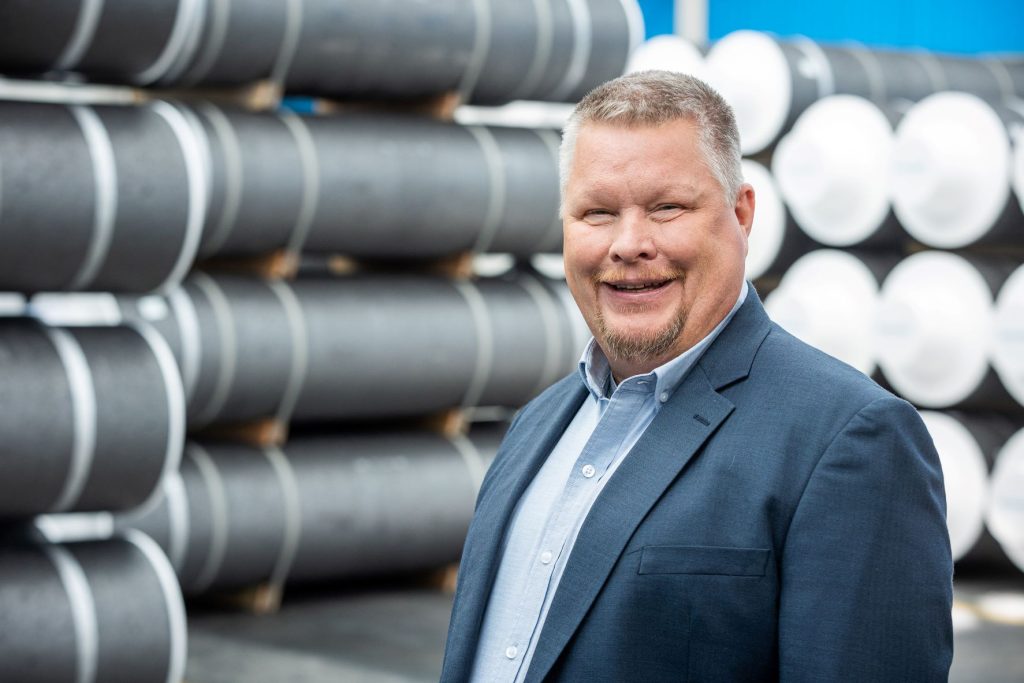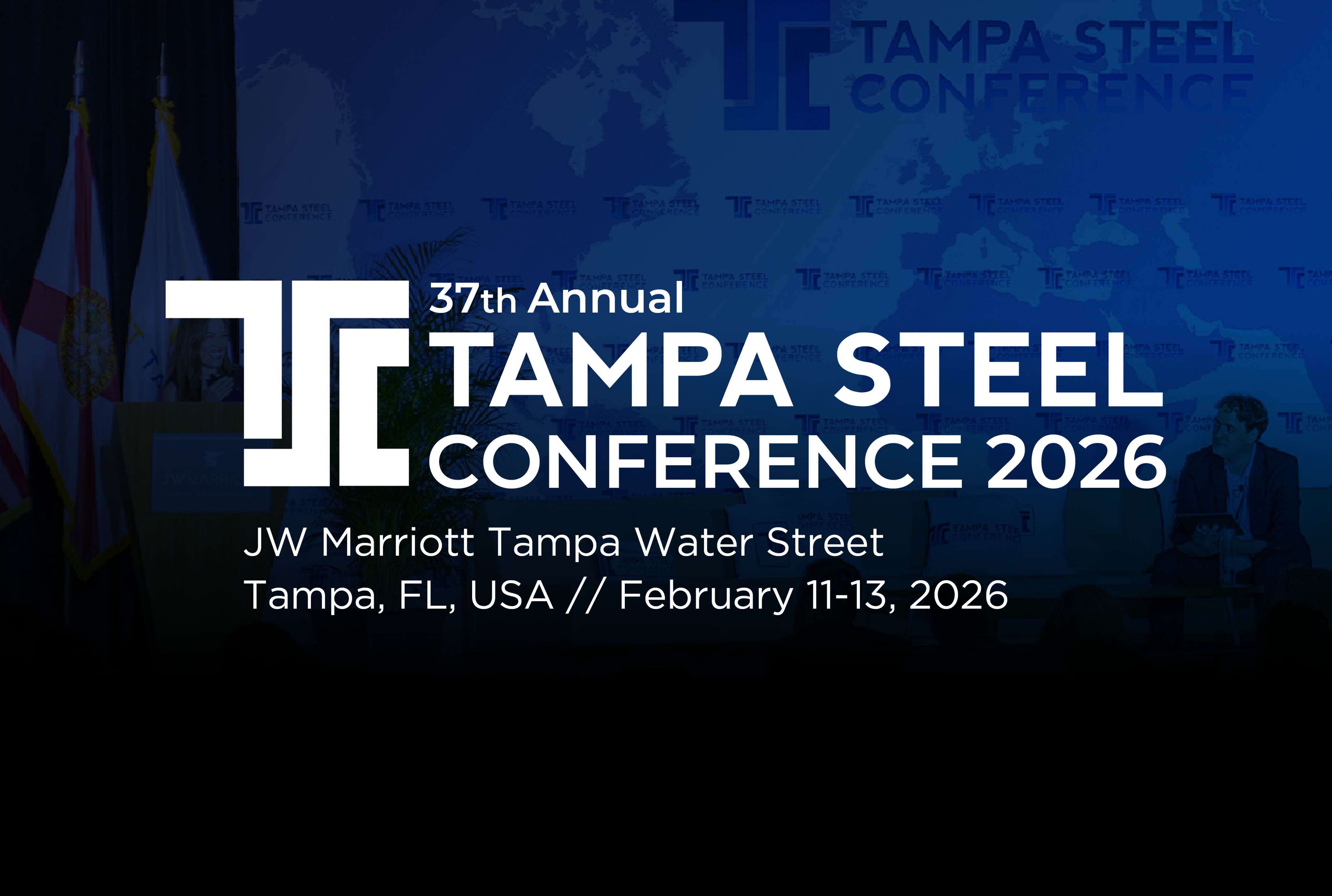Community Events
September 21, 2023
SMU Spotlight: Tim Saxon Talks Electrodes
Written by Becca Moczygemba
When you think about the steel industry, steel mills and service centers are probably at the forefront. But there’s one specific component that often flies under the radar: graphite electrodes.
An electrode is threaded onto a socket above the furnace. Electricity passes through the electrode, creating an arc of extreme heat that melts the contents of the furnace.
If you don’t know much about this subject, you’re in luck. Tim Saxon, the chief marketing officer for electrode manufacturer Resonac, made some time to talk to us about melting steel.
A lightly edited version of the interview is below.
Steel Market Update: Tell me a little about what you do at Resonac.

Tim Saxon: I’m the chief marketing officer, so I have a few responsibilities. The market analysis portion of it. We study the electrode, steel, and scrap markets to get a feel for where things are going. And then I also oversee the promotions, branding, and advertising side.
SMU: You guys make electrodes for use in steel mills?
TS: We are one, if not the world’s, largest ultra-high powered graphite electrode supplier. You’ll hear the term UHP and that’s ultra-high power; there are different grades. That’s primarily for melting furnaces. We have facilities all over the world: US, Spain, Austria, Malaysia–we have one in Japan.
SMU: How often do you have to replace an electrode?
TS: You’re not actually melting the steel with the electrode; you’re melting the steel with the arc that comes from the electrode. The electrodes oxidize and become part of the bath. It becomes part of the steel.
SMU: You mentioned there are a few grades of electrodes. What are the differences?
TS: One of the thing that’s important is that there is no universally agreed upon standard for electrodes. How the electrode is made is what determines the grade. Our primary raw material is needle coke. Needle coke is a byproduct of companies like Phillips 66 and other refineries. It’s the equivalent of scrap to an electric furnace steelmaker. There are a couple other ingredients like binder pitch and a couple others like stearic acids and things like that. Then the electrode is extruded and baked. All the volatiles get baked out.
SMU: It sounds like the oil industry plays a major part in creating electrodes. How do you guys look at decarbonization?
TS: I think all electrode suppliers are probably trying to explore different kinds of carbons like biocarbon, because I think that’s really where the next frontier is. But one of the ironic parts of the electrode business is we get the binder pitch that we use from the blast furnace and coke ovens. So that’s an ongoing question. As they start to shutter these blast furnaces, what’s going to happen to the pitch supply?
SMU: Are there other ways Resonac is integrating a green approach?
TS: We have really automated a lot of our facilities. In our Spanish facility for example, we’re reusing heat from our processes to preheat our other furnaces. At our Austrian plant we use process heat to heat the water for the village. We have this symbiotic relationship where they send water and then we use sort of our heat elements to heat the water that then goes back to the town and saves it for the residents. Our Japanese facility is on 100% hydropower. We’ve built this irrigation system for the farmers where we control the rice field flooding every season. So we’re helping the farmers and helping the citizens.
SMU: Wow! Sounds like you guys are doing some great things.
TS: Yeah, it’s a great time to be in the industry.
SMU: How did you choose the steel industry?
TS: I grew up in McKeesport, Pa. My dad and grandfather were both steel workers. I had an opportunity after college to get into the refractory business and I really enjoyed it. I’ve always loved the industrial part of the business.
SMU: Being in a leadership position, how do you hire and retain talent?
TS: We’re want to become the employer of choice and we think outside the box when it comes to recruiting. We’ve implemented several programs including:
- Our Way to Excellence – promotes cross-functional collaboration, transformational leadership and talent development.
- Employer of Choice Program – a global initiative to make Resonac Graphite the company where our employees and their loved ones want to work.
- Eager2Grow – the ongoing global program for Leadership Development of our today’s and tomorrow’s leaders.
- Focus on Success (FOS) – we utilize actionable data, integrated visual management tools, and robust communications platforms. Our teammates become real change agents that drive high performance, empowerment, opportunity, commitment, and engagement
We hire for attitude and train for aptitude. We stand by our values and live them. Our values include a solid vision and solid integrity; passionate and results driven; being agile and flexible; and having open minds and open connections. Resonac’s purpose is to change society through the power of chemistry.
SMU: It sounds like the company has a lot to be proud of.
TS: We focus on production-driven organizations rather than ones only worried about purchasing. Resonac is very, very committed to quality and a sustainable supply chain. There’s a lot that we do that our competitors don’t do. We have a complete global team of technical services and have invested a lot to help the furnaces run efficiently.
Click here to learn more about Resonac.






